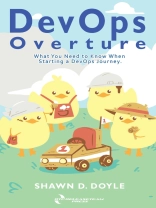The new culture of software development, explained by a 30-year industry veteran.
Over the last decade, more and more companies have adopted a new approach to software development called Dev Ops. But few people seem to understand what Dev Ops is—or how they might fit into a Dev Ops environment.
Dev Ops Overture answers these questions. It begins with an overview of what software development methodologies came before Dev Ops and of the problems associated with those systems. It then explains what Dev Ops is and how it works to address these problems. Finally, it offers advice to anyone who wants to position themselves for a career in Dev Ops and warns of common pitfalls to avoid.
Maybe your company has adopted Dev Ops, and you need to adjust to an Agile culture. Or perhaps your company hasn’t adopted Dev Ops, and you want to either advocate for the change or to position yourself to switch to a company that has. Or maybe you want to become conversant in Dev Ops practices. Either way, Dev Ops Overture is for you.
Shawn D. Doyle is a founder and CEO of Release TEAM, Inc., a Dev Ops Consulting Firm, established in 1999. After serving in the US Army and Desert Storm, he has amassed nearly 30 years of software delivery experience, having worked with companies from midsized to Fortune 100 to solve their business-critical challenges. Shawn lives with his wife and three dogs in Colorado.
Software is everywhere. Dev Ops makes better software. Here is where you start.
สารบัญ
Dev Ops Overture
Chapter 1
Before Dev Ops
The Waterfall Model
Problems with the Waterfall Model
Long Development Cycle
Lack of Timely Feedback
Siloed Teams
Potentially Toxic Organizational Culture
Stifling of Innovation
Responses to the Waterfall Model
The Toyota Production System (TPS)
Total Quality Management (TQM)
Incremental and Iterative Development
Lean
Agile
Chapter 2
Dev Ops to the Rescue
The Emergence of Dev Ops
Dev Ops Defined
How Dev Ops Works
Maximizing Flow
Obtaining Fast Feedback
Fostering a Positive Learning Culture
A Common Dev Ops Workflow
Who Uses Dev Ops
Chapter 3
Maximizing Flow
Assembling Small Cross-Functional Teams
Structuring Teams for Dev Ops
Ensuring Successful Teams in Dev Ops
Evaluating and Optimizing the Value Stream
Mapping the Value Stream
Wiping Out Waste
Eliminating Bottlenecks
Prioritizing Important Work
Making Work Visible
Applying Continuous Delivery
Doing Continuous Integration
Using an Automated Deployment Pipeline
Automating Common and Repetitive Tasks
Taking Advantage of Tools
Practicing Continuous Improvement
Chapter 4
Obtaining Fast Feedback
Shortening Feedback Loops
Automating Testing
Using Telemetry
Obtaining Feedback from Peers and Downstream Groups
Soliciting Customer Feedback
Minimum Viable Products (MVPs)
A/B Testing
Chapter 5
Fostering a Positive Learning Culture
What Is Organizational Culture?
Types of Organizational Culture
Gauging Organizational Culture
Hallmarks of a Positive Learning Organizational Culture
Offering Learning Opportunities
Encouraging Experimentation
Accepting and Learning from Failure
Practicing Zero Blame
Building Trust
Preventing Burnout
Motivating and Rewarding Employees the Right Way
Striving to Continuously Improve
Chapter 6
Dev Ops Roles
Common Dev Ops Roles
Product Manager
Enterprise Architect
Systems Administrator
Database Administrator
Software Developer
Cloud Engineer
Security Engineer
Test Automation Engineer
Automation Engineer
Site Reliability Engineer (SRE)
Subject Matter Expert (SME)
Mapping Traditional Roles to Dev Ops
Chapter 7
Positioning Yourself for a Career in Dev Ops
Critical Skills and Knowledge
Communication Skills
Collaboration Skills
Training and Education
Personal Qualities, Behaviors, and Attitudes
Chapter 8
Steering Clear of Common Pitfalls
Plan Your Dev Ops Initiative
Get Leadership Buy-In
Go All In
Don’t Scrimp on Resources
Don’t Just Pay Lip Service
Model Dev Ops to Fit Your Needs
Prioritize Culture
Stamp Out the Us-Versus-Them Mentality
Choose People Carefully
Don’t Demand Heroics
Appendix A: Dev Ops Resources
Appendix B: Tools for Dev Ops Success
Appendix C: Glossary
เกี่ยวกับผู้แต่ง
Shawn D. Doyle is co-founder and CEO of Release TEAM, Inc., a consulting firm, established in 1999 to guide clients seeking to adopt Agile practices and, later, Dev Ops. After serving in the US Army and Desert Storm, he has amassed nearly 30 years of software delivery experience. Today, Shawn works with companies ranging from mid-sized businesses to Fortune 100 organizations to solve their business-critical challenges. Shawn lives with his wife and three dogs in Colorado.












